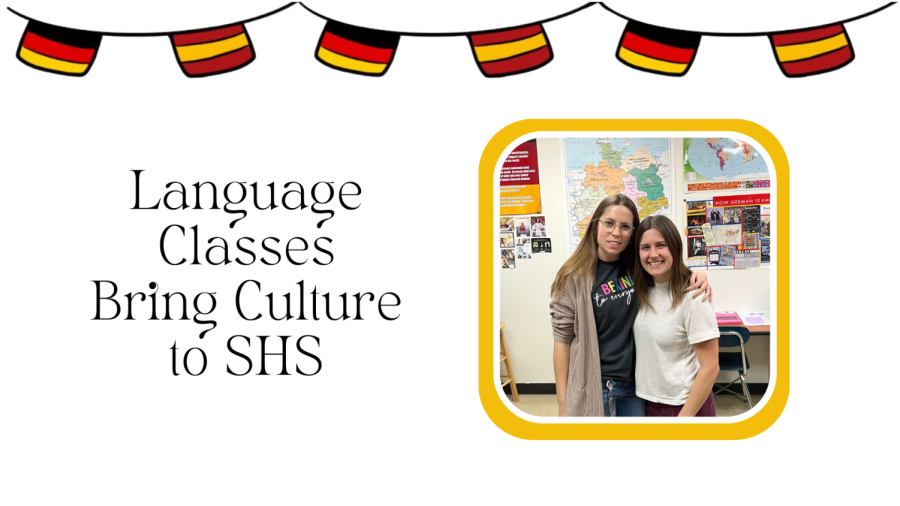World Language
In a world that contains thousands of languages, each incredibly unique, vastly different, and completely foreign to the majority of students at Stoughton High School, a once simple task of choosing to take a world language class may seem like a daunting decision, one larger than just filling an elective spot in your schedule.
Here at SHS, two world language classes are offered: Spanish and German. Five levels of each of these languages are available, starting with Spanish or German 1 and ending with AP Spanish or German.
Even though they are different languages, the levels of Spanish and German teach the same units with relatively similar assignments, just in their respective languages. Students can take the AP level in high school even though there are only four years and five levels; the most common way is through starting in middle school, although a placement test can be used as well. Spanish classes at SHS are taught by Taylor Nagel, Sam Raff, and Andrea Oelke. German classes are taught by Amber Little and Brianna Sweeney.
Besides the language itself, culture also plays an important role in all language classes, according to Andrea Oelke, teacher of Spanish levels 3 and 4 at SHS.
“The main thing about language is the idea of learning about the world and different cultures. And I feel like we don’t have enough classes [like those] at the high school. Simply by exploring [other cultures] and seeing them, [students] become more respectful,” Oelke says.
Similar to many students at SHS, Oelke started speaking Spanish in middle school. However, she didn’t truly realize all she could do with the skill until her sophomore year of high school when she started working at a restaurant in her hometown of La Crosse.
“A lot of customers would come in speaking Spanish, so I started to use my Spanish there, and I really loved the feeling of making someone feel more comfortable,” Oelke says. “I like connecting with people who maybe I wouldn’t have had the chance to because we don’t know each other’s languages; that bridges that gap.”
One of the main benefits of knowing a world language is its use in a student’s life outside of high school, specifically when they enter the workforce. Although there are many jobs that cater specifically to the knowledge of a world language, such as translator, Oelke explains that a world language is beneficial for many other careers as well.
“If you are interacting with people in any form in any job, it’ll be helpful to know another language,” Oelke says.
Although learning a language is the skill most focused on when discussing world languages, other skills come into play as well, as pointed out by Brianna Sweeney, teacher of German 1 and AP German at SHS.
“It helps you learn English a little better. You’re learning those pieces of a sentence like, ‘What is a verb, what is an adjective?’ When you learn them in another language, that kind of helps you understand them better,” Sweeney says. “It just develops your critical thinking skills, too. I think when you’re learning about another culture, it makes you think, why do we do the things we do? It’s definitely more than just learning that language or just learning that culture. There are all kinds of transferable skills that you gain.”
Travel is another reason knowing a world language may be beneficial to a person, as exhibited by the upcoming German trip. This summer, several German students will travel to Germany and stay in three different cities: Münster, Berlin, and Munich. The trip will be chaperoned by Oelke and Sweeney.
Although language classes aren’t mandatory, both Sweeney and Oelke value their importance at SHS. Oelke believes that language classes help students experience diversity, as well.
“[SHS would lack] diversity by not offering language classes,” Oelke says. “By not offering language classes, it shows that it’s not important to know another language, it’s not important to respect those who speak another language. We have many students in our community who speak Spanish at home, and simply by learning another language, you understand how difficult it is.”
Sweeney shares a similar sentiment.
“[If world languages classes weren’t offered, SHS] would lack the opportunity to really teach students how to be [global citizens.] Stoughton prides itself on saying ‘We’re preparing students to be global citizens’, but without a world language class, can you do that?” Sweeney asks. “Can you teach students how to be citizens of the world without teaching them what the world looks like? I think the answer is no. I think without world language classes, Stoughton wouldn’t be fulfilling that.”
Although Sweeney and Oelke encourage all students to try a world language class, they can admit that they may be intimidating to some, and so they aim to make their classrooms as comfortable as possible.
World languages certainly come with challenges, but that doesn’t necessarily mean that they’re not worth trying, as explained by Sweeney.
“I hope that students know that our classes are available, [that] our classes are welcoming. We want our classrooms full, we want students to learn all about diversity and global and cultural awareness,” Sweeney says. “Those transferable skills are so useful and if students want to learn all of those things and learn how to be great communicators, then please come regardless of what grade level you’re in. You can be a freshman in level one, I have seniors in level one, it’s never too late. And you don’t know until you try.”

Madeline is a senior, and this is her third year on staff! She's the features editor and social media manager. She joined the Norse Star because she loves...






